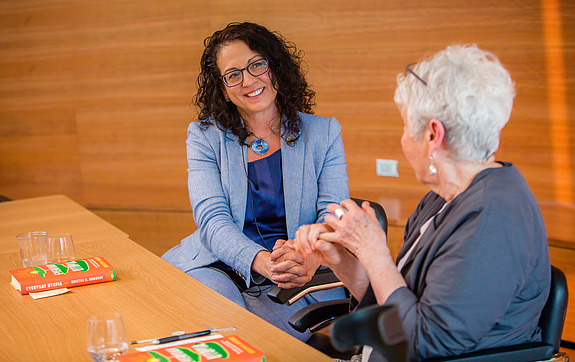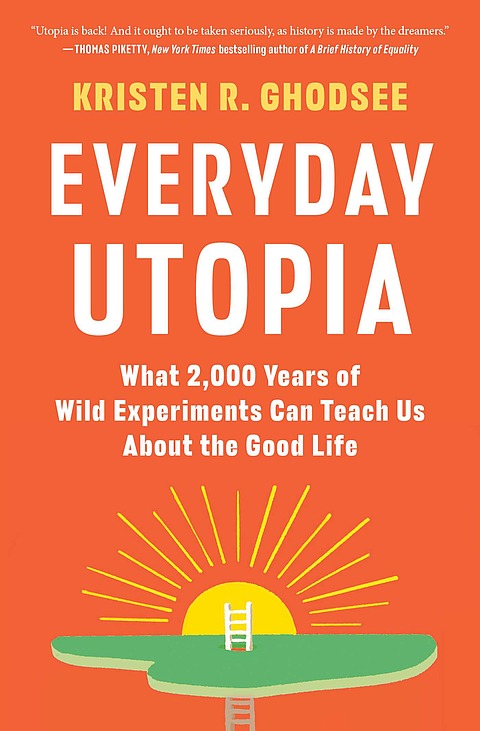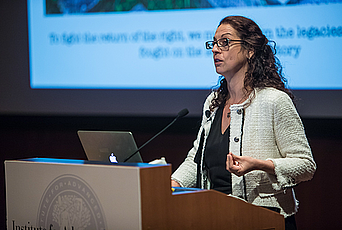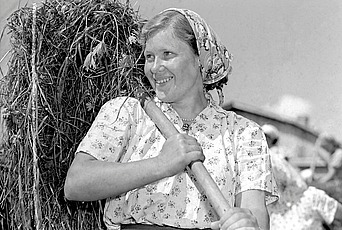Dreaming up the Good Life

Kristen Ghodsee, Member (2006–07) in the School of Social Science, is a dreamer. And she wants readers of her latest book, Everyday Utopia, to dream as well: “people are encouraged to use their wildest imaginations to help figure out how to patent more inventions to make more money for corporations or how to better market more Apple products (to use the paradigmatic example of the Steve Jobs’s ‘Think Different’ ad campaign between 1997 and 2002). But ordinary people imagining more just, equitable, and sustainable societies are castigated as unrealistic or hopelessly naïve.” Her frustration with the general acceptability of blue-sky thinking in the corporate world and in science and academia, but not in the world of politics, inspired her twelfth book Everyday Utopia: What 2,000 Years of Wild Experiments Can Teach Us About the Good Life during the pandemic. While some people were baking sourdough bread or brewing kombucha, Ghodsee, who was unable to travel to Eastern Europe for planned fieldwork, studied utopian communities. Rather than exploring utopian visions from the top down (as they are often conceived, especially in the twentieth century), Everyday Utopia focuses on visions that were, and are, bottom up. Ghodsee believes that smaller changes in the way we organize our individual domestic lives can aggregate into important changes that can help us tackle the most pressing challenges of the twenty-first century—like the climate crisis, the growth of inequality, the epidemic of loneliness and social isolation, and the crisis of care for both the young and the elderly. Most importantly, Ghodsee seeks to bring about a realization that actively dreaming of a better future is a radical political act: “we need social dreamers in the same way that we need water and air. [I want] to convince people that the utopian imagination is a fundamental part of what makes humans human.”

This interview has been edited for length and clarity.
Engaging Audiences...
I’ve written seven very traditional academic monographs published with university presses at Princeton, Chicago, Duke, and Oxford. I was ready to try something different—to speak to audiences beyond academia. I knew that many of my academic colleagues would look down on me for trying to write more accessibly for a general audience, but I felt it was politically imperative to make my research legible to people beyond the Ivory Tower. As a social scientist, I believe that we do our research to interrogate and better understand the human condition. There is always something missing if we don’t take the knowledge we’ve produced and somehow apply it.
... Even Through TikTok
Argh! I don’t know the first thing about TikTok. An undergraduate student at Penn created an account for me and, somehow, I ended up with more than ten thousand followers! I have little idea how to use that platform, and unfortunately my student graduated. The reason I don’t delete the account entirely is because I’ve learned that if I want to reach younger readers, I need to meet them in the places where they congregate.
Getting Personal
As an ethnographer, I always write my way into a chapter or article by starting with my own positionality as a researcher—it’s essential to reveal how my own point of view and life experience informs the scholarly arguments that I make. In academic writing, I usually cut those bits out from the finished product; sometimes you just need to make an argument and show the evidence. But other times, the arguments and the evidence are easier to comprehend if they are folded into a story. Some of the personal anecdotes were very uncomfortable, and I had to get used to the idea that my own personal experiences would help readers understand the broader theoretical points that I was making. But in conversations with different readers since the book came out, I’ve learned that the personal anecdotes do really resonate with people. They also help make the book more accessible, especially when it is being translated into other languages.
Living Utopia Everyday
I’m interested in changes that we can make in our individual lives that will aggregate into broad based social changes without the intervention of the state or mass coordinated social movements. It’s like individual young people in our societies deciding not to have children because of the climate crisis, or the precarity of our economies, or their very rational assessment that, in a capitalist society where human worth is measured in dollars, bearing and rearing children is a poor investment. They are not coordinating their choices, but they are making changes in their personal lives that will end up transforming our societies profoundly.
Trading Convenience for Community
I go out of my way to inconvenience myself for the sake of interacting with my community. I realize it is easier to order my groceries online, but I prefer to walk to my local grocery store. And when I get there, I usually refuse to use the automated checkout line. I prefer to interact with a human cashier who makes eye contact with me and engages in even the lightest of small talk. If I am not careful, I know I can get used to never having to interact with actual people, and that I might forget how to [socially interact].
Flexing our Cognitive Capacities for Hope
Hope is an emotion; it is the opposite of fear and anxiety. But it is also a cognitive capacity; it is the opposite of memory. Memory is a cognitive capacity that allows us to remember things in the past. Hope is a cognitive capacity that allows us to imagine ourselves as agents that can influence the future. When I hope, I am imagining a goal and mentally playing with different options for overcoming the various obstacles that prevent me from reaching that goal. So, on a daily basis, I try to spend time day-dreaming—actively just day-dreaming like I used to as a kid. Anarchists have this idea of “prefigurative politics” that I appreciate. They tell us that we should imagine the world that we want to live in, and then live our lives as if that world already existed. That’s what I try to do, even just a little bit, every day.
To read an excerpt from Everyday Utopia, download the pdf of the Fall 2023 Institute Letter.


